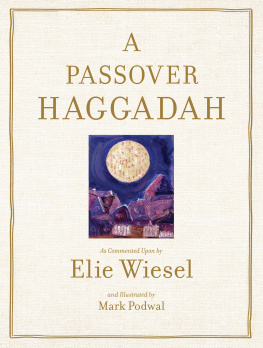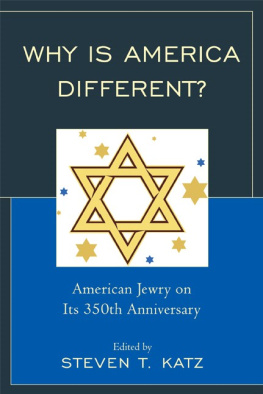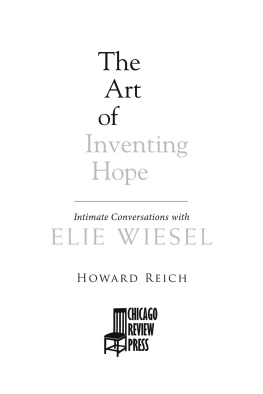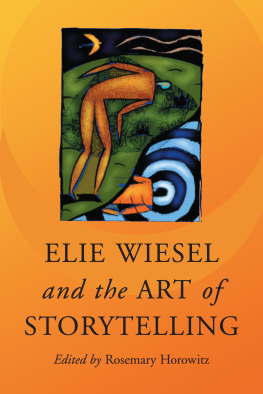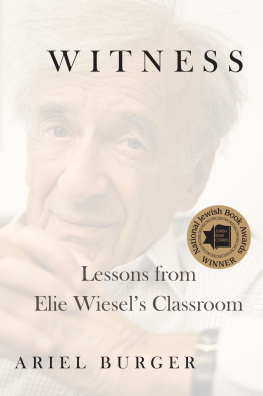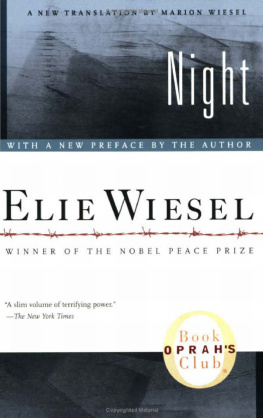Elie Wiesel - The Jews of Silence: A Personal Report on Soviet Jewry
Here you can read online Elie Wiesel - The Jews of Silence: A Personal Report on Soviet Jewry full text of the book (entire story) in english for free. Download pdf and epub, get meaning, cover and reviews about this ebook. year: 2011, publisher: Schocken, genre: History. Description of the work, (preface) as well as reviews are available. Best literature library LitArk.com created for fans of good reading and offers a wide selection of genres:
Romance novel
Science fiction
Adventure
Detective
Science
History
Home and family
Prose
Art
Politics
Computer
Non-fiction
Religion
Business
Children
Humor
Choose a favorite category and find really read worthwhile books. Enjoy immersion in the world of imagination, feel the emotions of the characters or learn something new for yourself, make an fascinating discovery.
- Book:The Jews of Silence: A Personal Report on Soviet Jewry
- Author:
- Publisher:Schocken
- Genre:
- Year:2011
- Rating:3 / 5
- Favourites:Add to favourites
- Your mark:
- 60
- 1
- 2
- 3
- 4
- 5
The Jews of Silence: A Personal Report on Soviet Jewry: summary, description and annotation
We offer to read an annotation, description, summary or preface (depends on what the author of the book "The Jews of Silence: A Personal Report on Soviet Jewry" wrote himself). If you haven't found the necessary information about the book — write in the comments, we will try to find it.
The Jews of Silence: A Personal Report on Soviet Jewry — read online for free the complete book (whole text) full work
Below is the text of the book, divided by pages. System saving the place of the last page read, allows you to conveniently read the book "The Jews of Silence: A Personal Report on Soviet Jewry" online for free, without having to search again every time where you left off. Put a bookmark, and you can go to the page where you finished reading at any time.
Font size:
Interval:
Bookmark:
Night Dawn The Accident The Town Beyond the Wall The Gates of the Forest The Jews of Silence Legends of Our Time A Beggar in Jerusalem One Generation After Souls on Fire The Oath Ani Maamin (cantata) Zalmen, or The Madness of God (play) Messengers of God A Jew Today Four Hasidic Masters The Trial of God (play) The Testament Five Biblical Portraits Somewhere a Master The Golem (illustrated by Mark Podwal) The Fifth Son Against Silence (edited by Irving Abrahamson) Twilight The Six Days of Destruction (with Albert Friedlander) A Journey into Faith (conversations with John Cardinal OConnor) A Song for Hope (cantata) From the Kingdom of Memory Sages and Dreamers The Forgotten A Passover Haggadah (illustrated by Mark Podwal) All Rivers Run to the Sea Memory in Two Voices (with Franois Mitterand) King Solomon and His Magic Ring (illustrated by Mark Podwal) And the Sea Is Never Full The Judges Conversations with Elie Wiesel (with Richard D. Heffner) Wise Men and Their Tales The Time of the Uprooted Rashi A Mad Desire to Dance The Sonderberg Case

Afterword by Martin Gilbert copyright 1987 by Schocken Books, a division of Random House, Inc. All rights reserved. Published in the United States by Schocken Books, a division of Random House, Inc., New York, and in Canada by Random House of Canada Limited, Toronto. The Jews of Silence was originally written as a series of articles for the Israeli newspaper Yediot Aharonot . Originally published in book form in hardcover in the United States by Holt, Rinehart and Winston, New York, in 1966. This paperback edition was originally published in the United States with different introductory material by Schocken Books, a division of Random House, Inc., New York, in 1987. Schocken Books and colophon are registered trademarks of Random House, Inc. Library of Congress Cataloging-in-Publication Data
Wiesel, Elie, [date] The Jews of Silence
Translation of: Les juifs du silence.
1. JewsSoviet Unionpersecutions. 2. Wiesel, ElieJourneysSoviet Union. 3. Soviet UnionDescription and travel19451969. 4. Soviet UnionEthnic relations. 5. Jewish authorsJourneysSoviet Union. I. Title.
DS135.R92W5313 1987 305.8924047 86-26134
eISBN: 978-0-8052-4297-3 www.schocken.com Cover photograph by Tamara Staples
Cover design by Emily Mahon v3.1
Contents
Introduction to the 2011 Edition
Of all the volumes I have written over the last fifty years, this is the one that brings back to me a sense of joy.
I remember: fall 1965. My first journey to the Soviet Union. In my quest for my Jewish brethren, I had no idea what was awaiting me in that godforsaken land. Will I find them? Are they still there? Havent they been either physically annihilated by Hitler or spiritually assimilated by Stalin?
Israeli officialsMeir Rosenne in New York, Ephraim Tari in Pariswere the ones who pushed me to make the trip: Why waste words? Go and see for yourself. They gave me one name: David Bartov, a legendary figure, the number two at the Israeli embassy in Moscow. All three eventually became cherished friends.
Yom Kippur in Moscow, a Shabbat in Kiev, a day or two in Georgia, Sukkot in Leningrad (today St. Petersburg), back to Moscow for Simchat Torah: first I encountered fear among the old people, then it was replaced by the exuberance of the young.
I said to myself then and I repeat it now: perhaps I survived only to serve as a witness to the anguished ancestral faith of the former and the inspiring courage of the latter.
The morning prayer and Talmud study in one small room; the dancing in the street in front of the Great Synagogue in Moscow (steps away from the infamous Lubyanka Prison); the clandestine meetings in Jewish cemeteries, where I taught young Jewish boys and girls chapters of Jewish history and popular songs about life in the ghettos and the dreams of Jerusalem. I returned to Israel filled with the memories of faces, tears, and tales that touched my soul and remain in my heart.
I still remember the whispers in houses of prayer, and the anonymous pieces of paper pushed into my pockets at concerts of Jewish music: Please, brother Jew, do not forget us.
I promised. I promised each and every one of them that I would become their messenger. That I would carry sparks of their flame to New York and Paris and Londonwherever Jews and their allies live in security and freedom.
With my faithful friend David Bartov, I walked the streets of Moscow, trailed by not-so-secret agents, exchanging impressions and possible conclusions: Would this situation endure forever? Will the iron gates there ever be lifted? Will Russian Jews ever be allowed to go home to their historic Land of Israel? Both of us were skeptical, worried.
Oh, yes, we gave consoling words to the Jews we encountered; we tried to persuade them that redemption was assured and near. But we ourselves didnt believe it. There was no practical, concrete reason to have faith in our own promises.
If anyone had told us then that, in our lifetimes, we would witness the collapse of the Communist dictatorship and the birth of freedom in the USSR, we would have sent him to a mental institution to be healed of his hallucinations.
I returned to be with them a year later, again for Simchat Torah; I sang with them, laughed with them. I was foolish enough to carry in my bag the first copy of The Jews of Silence in French; I was almost arrested. I tried to return a third time and was unable to receive a visa. It was given to me only in 1979, when I came with an official delegation. More visits followed after I received the Nobel Prize in 1986.
On one occasion, a clandestine encounter with dissidents was arranged somewhere in a private home. A man I had never met approached me. I have a gift for you, he said, handing me a heavy envelope. This is my Russian translation of your book Night . I printed a few hundred copies in samizdat (underground publishing; it was against the law to publish my books in the USSR). All are gone. This is the last copy. I kept it for you.
I thought: My God, this man risked arrest and prison just to make my writing available to people here! What could I do to show him my gratitude? I embraced him with tears in my eyes.
The same evening, in another room, a second man approached me. I have a gift for you. I knew I would meet you one day. It was his translation of Night .
The two men didnt know each other.
So I took the second translator to the other room to meet his unknown colleague. They both realized that as each worked on my book they were not really alone. They fell into each others arms, laughing and crying at the same time.
I have both translations and keep them as invaluable treasures. They remind me of the time when Jews in the Soviet Union exposed themselves to peril by wanting to remain Jewish.
Today nearly a million of them live in Israel. Others emigrated to America.
How can the author of The Jews of Silence not experience pure joy?
To the Reader
The pages that follow are the report of a witness. Nothing more and nothing else. Their purpose is to draw attention to a problem about which no one should remain unaware. However, they pose only the rudiments of a question, and reflect an anguish; they do not pretend to a solution or remedy.
Having never been involved in political action, I hope that what I have written here will neither exacerbate the cold war nor be used for political purposes. I have never engaged in propaganda, and have no intention of beginning now.
In the course of a trip to the Soviet Union that coincided with the Jewish High Holy Days of 1965, I tried to assess and, if possible, to penetrate the silence of the more than three million Soviet Jews who have, since the Revolution of 1917, lived apart from their people. Regarding other aspects of life in Russia, I do not feel qualified to pass judgment.
Font size:
Interval:
Bookmark:
Similar books «The Jews of Silence: A Personal Report on Soviet Jewry»
Look at similar books to The Jews of Silence: A Personal Report on Soviet Jewry. We have selected literature similar in name and meaning in the hope of providing readers with more options to find new, interesting, not yet read works.
Discussion, reviews of the book The Jews of Silence: A Personal Report on Soviet Jewry and just readers' own opinions. Leave your comments, write what you think about the work, its meaning or the main characters. Specify what exactly you liked and what you didn't like, and why you think so.






